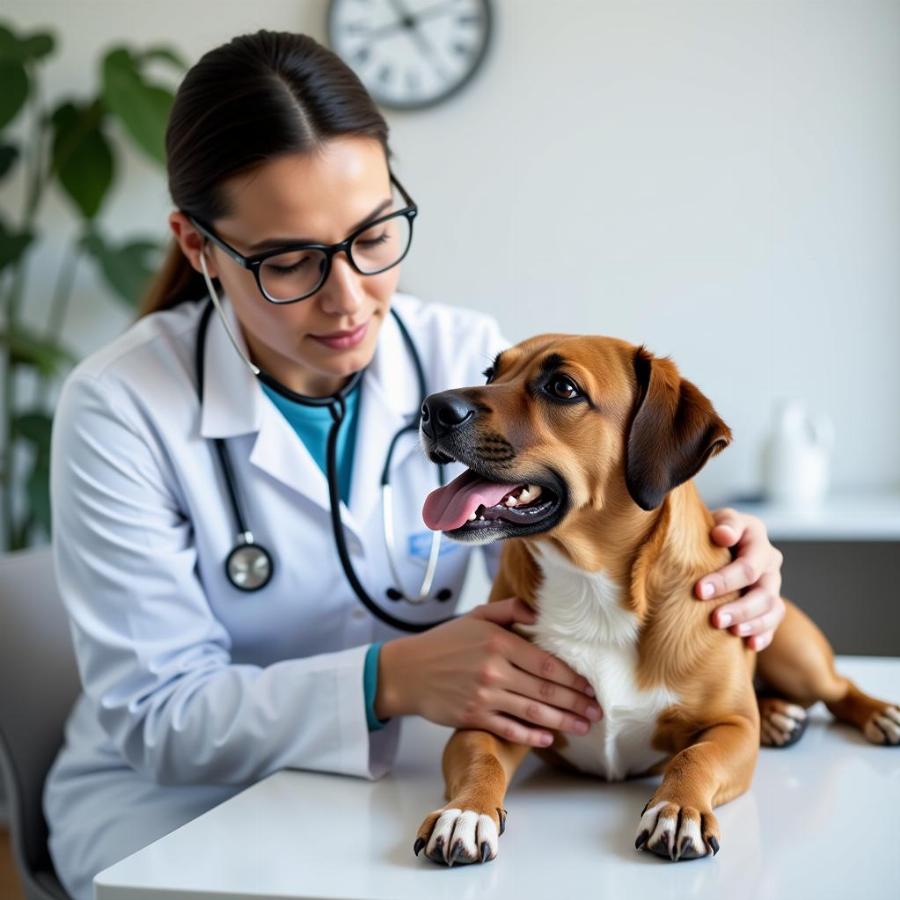Vitamin E is a crucial nutrient for dogs, contributing to their overall health and well-being. It plays a vital role in maintaining a healthy immune system, protecting cells from damage, and supporting various bodily functions. Understanding the importance of vitamin E and how to ensure your dog receives adequate amounts is essential for responsible pet ownership. This article will delve into the benefits, sources, and potential risks associated with vitamin E for dogs.
The Benefits of Vitamin E for Dogs
Vitamin E acts as a powerful antioxidant, protecting your dog’s cells from damage caused by free radicals. These unstable molecules can contribute to aging and various health problems. Vitamin E also supports the immune system, helping your dog fight off infections and diseases. Additionally, it plays a role in cell function, muscle health, and even reproductive health. For dogs with certain medical conditions, vitamin E can be particularly beneficial. For instance, it can help manage conditions like arthritis and cognitive decline.
Sources of Vitamin E for Dogs
Dogs can obtain vitamin E from various sources. A balanced, high-quality dog food often contains sufficient amounts of vitamin E to meet a dog’s daily requirements. However, some dogs may benefit from supplemental vitamin E, especially if they have specific dietary needs or health conditions. Always consult your veterinarian before adding any supplements to your dog’s diet. They can assess your dog’s individual needs and recommend the appropriate dosage and form of vitamin E.
Natural Food Sources of Vitamin E
Several natural food sources are rich in vitamin E, and incorporating these into your dog’s diet (under veterinary guidance) can be a healthy way to boost their intake. Foods like spinach, sunflower seeds, and almonds are excellent sources of vitamin E. However, it’s important to note that some of these foods, like almonds, should be given in moderation due to potential choking hazards or other health concerns. Always discuss adding new foods to your dog’s diet with your veterinarian. Similar to prenatal vitamins for dogs, a balanced approach is key.
How Much Vitamin E Does My Dog Need?
The appropriate dosage of vitamin E for dogs varies depending on several factors, including size, age, breed, and overall health. Providing too little vitamin E can lead to deficiencies, while excessive amounts can be toxic. Therefore, it’s crucial to work with your veterinarian to determine the optimal vitamin E intake for your furry friend.
What are the signs of Vitamin E deficiency in dogs?
Recognizing the signs of vitamin E deficiency is essential for prompt intervention. Symptoms can include muscle weakness, loss of coordination, and vision problems. If you notice any of these signs in your dog, consult your veterinarian immediately for proper diagnosis and treatment. Like b vitamins for dogs, ensuring appropriate levels of vitamin E is essential.
Risks of Excessive Vitamin E in Dogs
While vitamin E is essential for canine health, excessive intake can pose health risks. High doses of vitamin E can interfere with blood clotting and lead to bleeding problems. It’s vital to adhere to the recommended dosage provided by your veterinarian and avoid giving your dog vitamin E supplements without professional guidance. This is especially crucial for pregnant dogs, where vitamin levels need careful monitoring, similar to considerations around vitamins for pregnant dogs.
 Veterinarian Examining Dog
Veterinarian Examining Dog
Conclusion
Vitamin E is a vital nutrient for dogs, playing a crucial role in their overall health. From boosting the immune system to protecting cells from damage, the benefits of vitamin E are numerous. Ensuring your dog receives the correct amount of vitamin E through a balanced diet and appropriate supplementation (under veterinary guidance) is key to maintaining their well-being. Always consult your veterinarian before adding any supplements to your dog’s diet. They can provide tailored advice based on your dog’s individual needs and help prevent potential health risks associated with vitamin E deficiency or overdose. Remember, a proactive approach to your dog’s nutrition is essential for a long and healthy life. For older dogs, vitamin needs may change, and consulting with your vet about appropriate dog vitamins for older dogs is highly recommended.
FAQ
-
Can I give my dog human vitamin E supplements? No, it’s not recommended to give your dog human vitamin E supplements. These may contain different formulations and dosages that are not suitable for dogs.
-
What are the best dog foods with vitamin E? High-quality dog foods formulated for specific life stages or health conditions often contain appropriate levels of vitamin E. Consult your veterinarian for recommendations.
-
How can I tell if my dog has a vitamin E deficiency? Symptoms of vitamin E deficiency can include muscle weakness, loss of coordination, and vision problems. Consult your veterinarian for diagnosis and treatment.
-
Are there any side effects of vitamin E supplementation in dogs? While generally safe, excessive vitamin E intake can lead to bleeding problems. Always follow your veterinarian’s recommended dosage.
-
Can vitamin E help my dog’s skin and coat? Vitamin E can contribute to healthy skin and coat by protecting cells from damage. However, it’s important to address underlying skin issues with your veterinarian.
-
Is vitamin E good for senior dogs? Yes, vitamin E can be beneficial for senior dogs, potentially helping with cognitive function and mobility. Discuss appropriate multi vitamins for dogs with your veterinarian.
-
Can I give my dog vitamin E every day? The frequency of vitamin E supplementation depends on your dog’s individual needs and the veterinarian’s recommendations.
Beaut Dogs is your one-stop resource for all things related to show dogs, providing reliable and in-depth information on breed characteristics, care, and training. When you need assistance, please contact us at [email protected] (Email address) to receive detailed and accurate answers from Beaut Dogs. We’re here to help you navigate the exciting world of canine companionship. Visit us at Beaut Dogs.